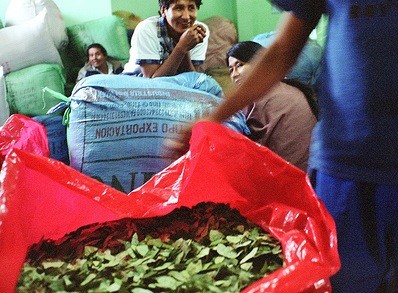Stories from 29 March 2011
Philippines: TV Host Accused of Child Exploitation
Netizens from the Philippines want authorities to address what they believe was a case of child exploitation on prime time TV when a child was encouraged by a program host to present a sexy dance performance.
Tunisia: Bloggers Angry at Interim Interior Minister Sacking
Tunisian bloggers are outraged over the sacking of Interim Interior Minister Farhat Rajhi today. In a surprise move, he was replaced by Hbib El-Seed. Netizens are now calling for his return to managing his portfolio in blog posts and on Facebook.
Australian blogger disappears in China
An Australian blogger and spy novelist, Yang Hengjun, is missing in China. He may have been arrested by Chinese authorities.
Bolivia’s Conflicting Stance With the USA on Coca Chewing
The 1961 UN Single Convention on Narcotic Drugs ordered the elimination of chewing coca leaves within 25 years of the treaty going into effect. Bolivia has again resurfaced as a proponent to eliminate this UN ban. The US moved to block Bolivia’s request, further citing that an amendment to the article shows Bolivia’s lack of cooperation in the fight against the drug trade.
Greece: Thessaloniki Documentary Festival Succeeds in Hard Times
The week-long 13th Thessaloniki Documentary Festival presented a line up of approximately 220 films from around the world from 11-30 March, 2011, in Thessaloniki, Greece. Themes included regional retrospectives (this year focusing on the Middle East and Africa) and tributes to Ukrainian filmmaker Sergei Loznitsa and Czech Helena Trestikova.
Africa: Coders4Africa
Coders 4 Africa is an initiative by several gentlemen of African origin. The initiative aims at developing African software development talent by providing access to free, high quality training in software development.
Nigeria: Remember Saro-Wiwa
Remember Saro-Wiwa is a coalition of organisations and individuals which aims to create a Living Memorial to activist and writer Ken Saro-Wiwa in London, using art and activism to raise awareness and campaign for environmental and social justice in the Niger Delta.
Haiti: Not Like Japan
Toussaint on Haiti has been avoiding news of the Japan earthquake for fear of “triggering sad memories”, noting that stories of recovery there “really b[ring] home…the dysfunction that exists in Haiti.”
Africa: Africa Movie Academy Awards (AMAA)
Mighty African writes about Africa Movie Academy Awards (AMAA): “Viva Riva, a film from the Democratic Republic of Congo (yes, they make films there too and they ain't always about rape) was the big winner at the Africa Movie Academy Awards held last weekend in Bayelsa State.”
Nigeria: What Are Nigerian Bloggers Saying About the 2011 Elections?
As the 2011 Elections in Nigeria draws near, Nigeria bloggers are busy talking about the elections and the future of their country but is anyone listening?
Mexico: New (Dis)Agreement on Reporting Violence
On March 24, most of the biggest Mexican media outlets signed the "Agreement to Cover Violence in Mexico," an agreement that unifies the editorial criteria to cover and report news related to "the drug war." Many support and defend the document, but the text has also sparked strong disagreement and criticism.
Trinidad & Tobago: Carnival is Over
Trinidad Carnival Diary offers tips on how to “fill the void between now and another Carnival…”
Cuba: More on Carter
Cuban bloggers continue to comment on former U.S. President Jimmy Carter's visit.
Peru: Analysis of Latest Election Poll Results
Silvio Rendon from Gran Combo Club [es] analyzes the latest election poll results. The latest poll from March 27 shows candidate Ollanta Humala in the lead with Alejandro Toledo and Keiko Fujimori close behind him: “Humala's growth, the collapse of Toledo and Fujimori's stagnation follow a trend seen previously,” Silvio...
Guatemala: Should Inmates be Allowed to Vote?
Blogger Luis Figueroa [es] wonders if inmates should be allowed to vote in the upcoming elections. Guatemala's Tribunal Supremo Electoral (Supreme Electoral Tribunal) is considering installing polling stations in prisons to allow inmates to vote.
Honduras: Teacher Protests Continue
Hemispheric Brief reports: “Teacher protests continued in Honduras Monday, despite a threat from President Pepe Lobo that his government would begin suspending, without pay, those who did not return to their classrooms this week. […] The protests, triggered by six months of unpaid wages to Honduran teachers, are now entering...
Nigeria: Ken-Saro Wiwa “Killer” Judge Becomes Acting Chief Judge
Justice Ibrahim Auta, the judge who was handpicked by the Abacha regime to head the kangaroo tribunal that sentenced renowned environmentalists and minority rights activist Ken Saro-Wiwa to death by hanging, today [March 16, 2001) became the Acting Chief Judge of the Federal High Court.
St. Lucia, Trinidad & Tobago: Bocas Shortlist
“A Nobel laureate, a MacArthur ‘genius’ fellow, and a first-time author are finalists for the 2011 OCM Bocas Prize for Caribbean Literature”: Caribbean Book Blog has the details.
Côte d'Ivoire: Where is Gbagbo's General, Philippe Magou?
Monday March 14, 2011, was a busy day in Côte d'Ivoire. After violence this past weekend in the Abobo district of southerly economic capital Abidjan, Ivorians in the city were woken up by Kalashnikovs and heavy artillery. For a few days now, the rumors in Abidjan have been growing as to Ivorian army General Philippe Mangou's responsibility in this crisis.
Lebanon: Claim your Parking Spot
Dutch Blogger Sietske asked the Lebanese people in her latest post to claim what's rightfully theirs: “their parking spots.”
Lebanon: Ontornet instead of Internet
Frustrated with the very slow internet connection in Lebanon, a group of Lebanese bloggers started a campaign calling it “Ontornet” (“Ontor” in the Lebanese dialect means “wait”) to do something about it. They explained it all in this blog post.






